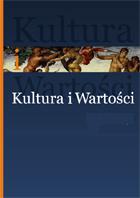
Świat życia niegdyś i dzisiaj
Tekst nadesłany jako słowo powitalne do uczestników konferencji Moralność - między teorią a światem przeżywanym, Toruń, 26 września 2014
More...We kindly inform you that, as long as the subject affiliation of our 300.000+ articles is in progress, you might get unsufficient or no results on your third level or second level search. In this case, please broaden your search criteria.

Tekst nadesłany jako słowo powitalne do uczestników konferencji Moralność - między teorią a światem przeżywanym, Toruń, 26 września 2014
More...
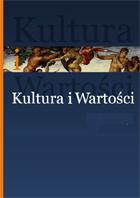
Artykuł stanowi próbę odpowiedzi na pytanie czy specyficzny sposób postrzegania „obcego”, zbadany i opisany przez psychologię społeczną, ma swój filozoficzny odpowiednik w naukach o moralności oraz czy możliwe jest przejście z refleksji psychologicznej do namysłu etycznego. Autor rozważa także szczególny charakter trzech rodzajów relacji „my – oni”, „swoi – obcy”, „ja – ty”. W ustaleniu różnic i podobieństw między refleksją filozoficzną a psychologiczną wykorzystany został podział dehumanizacji ze względu na formy, które może ona przybierać, zaproponowany przez włoską badaczkę, Chiarę Volpato. W wyniku szczegółowych analiz autor dochodzi do wniosku, że pewnym remedium na kategorialny i esencjalizujący charakter dehumanizacji jest zwrócenie się ku relacji „ja – ty”, opisywanej przez filozofię dialogu. Zwrot ten mógłby przyczynić się do zapobiegania szkodliwym antagonizmom społecznym i pozwala dostrzec w „Innym” nie wrogie i zagrażające indywiduum, lecz równorzędnego uczestnika dialogicznej relacji.
More...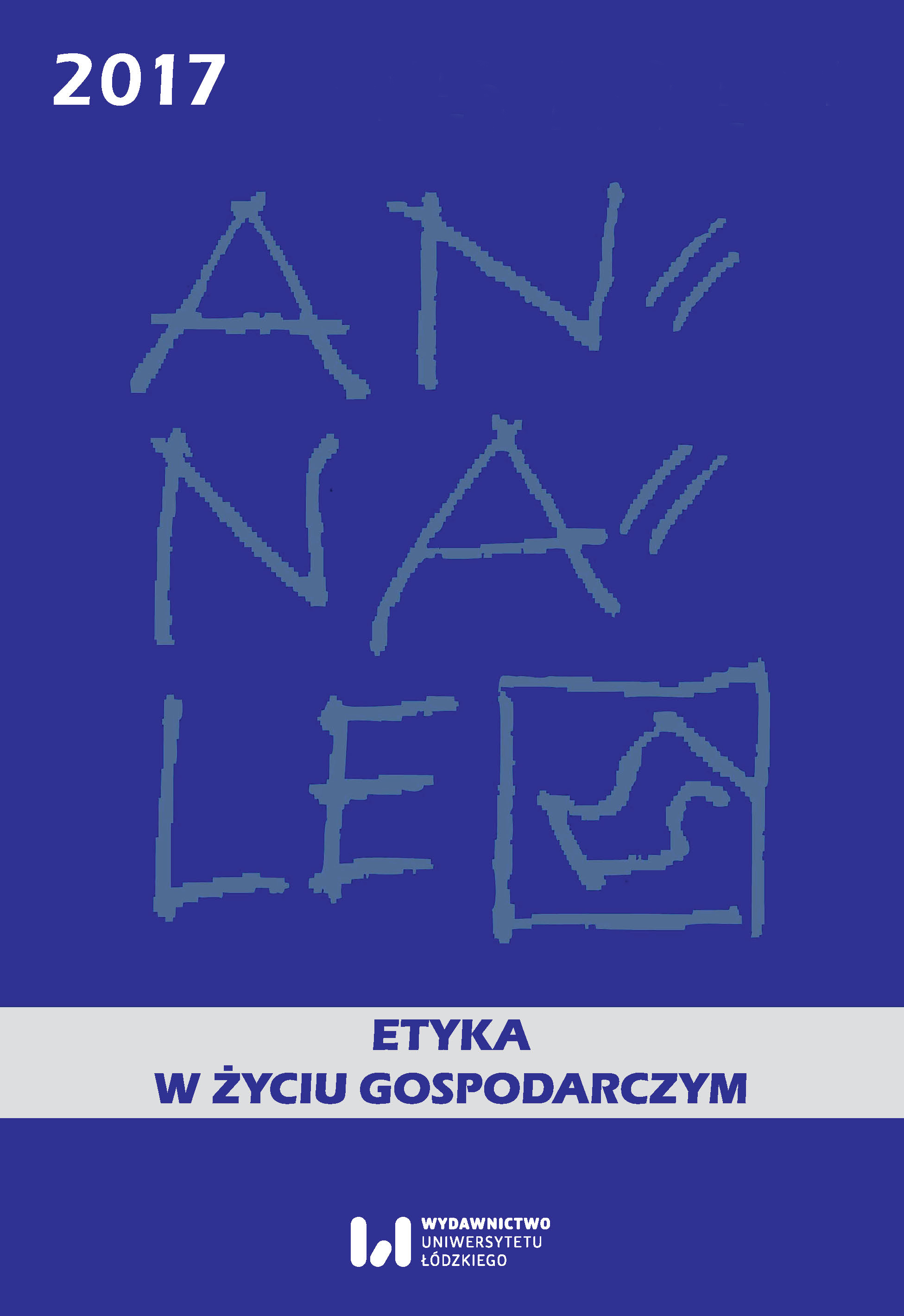
We find ourselves in times where national leaders engage in fraudulent and deceptive behaviors for personal and political gains, and multinational corporations use unethical practices to maximize their profits. Where dangerously defective products are released onto the market endangering the health and lives of consumers, and where news channels become opinion channels. Where the motto of the free market is reduced to a simple ‘grab all you can, any way you can.’ In times such as these, it is difficult to teach and promote ethical behavior. A cursory look at the advertising messages and the spins put on issues by public relations people leaves one wondering if business ethics is anything more than an oxymoron – a self‑contradicting claim. In times such as ours (in 2017), it is crucial that institutions of higher learning continue to teach and foster ethical behavior and ethical responsibility. No doubt, it is an uphill struggle for educators to convince students to think and act in ethically appropriate terms when surrounded by corruption, deceit, and fraud. While no one will deny the need for ethical practices, teaching these values in a convincing manner remains a challenge. Using meta‑analysis of various University courses in ethics, the present paper attempts three goals. First, it builds a rationale for the importance of ethical behavior, the need for teaching it, and the criticisms of those who think it unnecessary to teach ethics. Second, it discusses various strategies used by universities and several educators in teaching and reinforcing ethical behavior. This section also offers a criticism of approaches and methodologies of teaching ethics. Third, it offers an outline for a syllabus for an introductory course in Ethics.
More...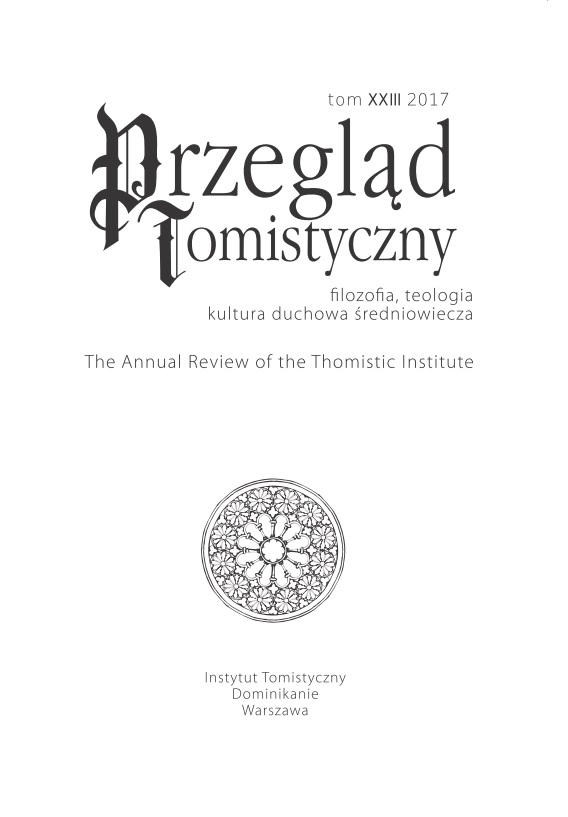
This article is concerned with an accurate reading of St. Thomas Aquinas’s doctrine of natural law that would secure the intelligibility of its principles from the reductions of moral emotivism. It aims to show that in light of some criticisms of a “purely ethical” reading of this doctrine, the sources of intelligibility of practical reason cannot be detached from his metaphysical insights, especially those concerning the notion of the good (ratio boni). Moreover, it points out that for Aquinas the principles of natural law based on the intelligibility of the good require some sort of imitation of nature by practical reason. The “purely ethical” interpretations, which tend to disregard the intelligibility of the good manifest in the realm of physical natures, may turn out to be unable to account for the rational truthfulness of the doctrine of natural law intended by Aquinas.
More...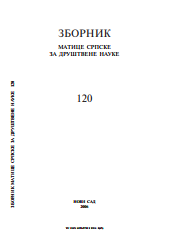
Mutual relatedness of law and morality appears at three levels of legal order (legislature, application of law and interpretation of law); since law and morality have a common origin and common goal, every legislative decision at the same time represents a political decision, and thus the realization of the goals of social policy. Arguments for making legislative decisions always have an ethical pretext, although the very notion of morality changed in time. Ethical arguments could be sensu stricte also ethically relevant, which was noticed by numerous theoreticians. For several years, there has been a theoretical discourse about that issue among sociologists, philosophers of morality and, above all, legal theoreticians. In that discourse, moral arguments surpass all other reasons, although the principles of differentiation of legal and moral norms are more or less agreed upon. Another controversial issue is if, and to which degree, it is possible and permissible to pass moral laws analogically to classical legislature. People also talk about „moral legislature" which reflects the specificity of the relation between law and morality in the legislative process. It is a general conclusion that the rational legislator in the legislating process has to start from the principles of law as a moral minimum.
More...
The article examines trends towards uniformity in three important areas of the law of international arbitration: ethical standards for arbitrators, procedures for evidence taking, and application of transnational rules of law. While there is a clear movement towards the harmonisation of legal concepts and standards in all three areas which is the result of changes in international and domestic law, the practice of international arbitral tribunals and the activities of private or intergovernmental “formulating agencies”, a comparison of developments also shows important differences. The degree of convergence which can be achieved depends on the acceptance of privately proposed rules by arbitrators, arbitral institutions and, to a certain degree, also by the courts reviewing the arbitral process. The described developments do not support the idea of the existence of an autonomous body of lex mercatoria, but provide ample evidence of a “transnationalist” attitude of arbitrators, arbitral institutions and formulating agencies, which aims at identifying and applying legal concepts to international commercial transactions which are consistent with their international character.
More...
The purpose of this paper is to assess the informed consent requirements in the Universal Declaration on the Human Genome and Human Rights, the International Declaration on Human Genetic Data and the Universal Declaration on Bioethics and Human Rights. These requirements represent recent international attempts to make informed consent central to ethically and legally acceptable medical and research practices. The author shows that the given standards are minimal and that the drafters failed to make consent and consenting rigorous and a fully specific. Yet, while some national laws have gone beyond these standards, the author reminds that in most countries legislation addressing the social implications of biotechnological developments is either unsystematic or nonexistent. Hence, although not fully determined and included in legally non-binding instruments, the authoritative statements concerning informed consent in the UNESCO declarations represent a very helpful what-to-do list. Moreover, the declarations are the most thorough global initiative thus far to consider human rights implications of biomedical sciences and as such, symbolize an important step in protecting human rights in the area of bioethics.
More...
Current legal solutions regulating medical treatment of terminally ill or incurable patients (except for solutions adopted in the Dutch law) are based on the view of limited sanctity of human life, a standpoint supported by traditional medical ethics, legal doctrine, medical and court practice. According to that view, criminal and civil law recognize patient's right to passive euthanasia and active indirect euthanasia, subject to material and procedural limitations set by the law and which fall under the scope of so-called normal medical practice, while at the same time incriminating right to physician's assistance with suicide and the right to active direct and voluntary euthanasia. View of the modern medical ethics, legal doctrine and medical and court practice, also supported by the author, is that there are no moral and legal reasons for different legal status of passive euthanasia and active indirect euthanasia, on one side, and physician's assistance with suicide and active direct and voluntary suicide, on the other side.
More...
In recent times, the concept of virtue has regained a prominent role in public discourse and in academic ethics as well. However, it has not yet been dealt with very much in contemporary political theory and legal philosophy. This paper aims at clarifying the relationships between law and moral virtues in two respects. First of all, there is the question as to whether and to what extent the law may urge its addressees to be virtuous by enforcing or fostering the respective character dispositions. The second question is whether and to what extent a well-functioning legal order is dependent on moral virtues of the citizens. As to the first question, the paper defends the widely shared view that a legitimate legal system must not enforce virtue and may foster them only to a limited extent.
More...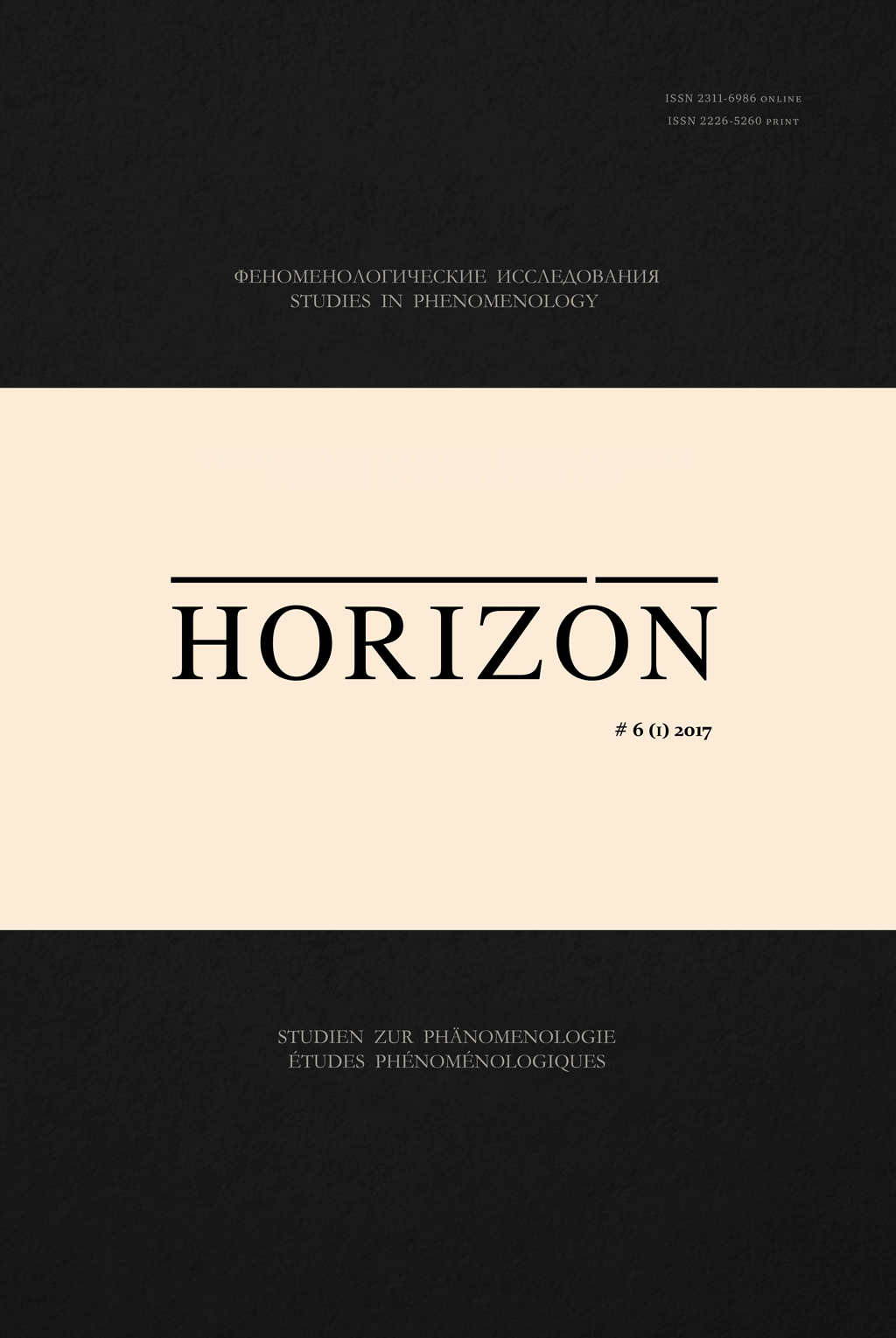
The paper presents an assessment of the Husserlian concept of Lebenswelt on the basis of the late manuscripts on genetic analysis. The reflection on the concept of the life-world intends to evaluate the contribution of phenomenology to the philosophical debate beyond the contention between realism, naturalism, and subjectivism. The paper starts by evaluating the idea of the “universal correlation”, thereby stressing the egological figure of the “Ich-kann” (I-can) as the proper candidate to achieve the constitution of the life-world. The author claims that the constitutive activity of the I-can is based not only on intellectual and perceiving acts, but rather on a comprehensive praxis, which also bears ethical meaning. The sense-borrowing activity of the I-canis namely responsible for the inner articulation of the plural particular worlds (Sonderwelten)within the encompassing life-world. Such a relation between interest-centered worlds and the encompassing life-world is not merely empirical and cannot be explained in causal and factual terms. It rather points out a peculiar subjective responsibility intended as a specific access to the world that bears a significant moral meaning. Here appears a pre-predicative and pre-normative form of responsibility rooted in the temporal and intentional structure of experience, connected with the first forms of socialization and with the essential structure of the life-world as a world“for everybody”.
More...
This paper considers the problems of communitarian ethics by the example of mahallah, a traditional social and territorial association of local residents in Arab countries. It is typical in Asian and Eastern countries, as well as in Tatar rural settlements. Mahallah, as a specific social institution, is characterized by the distinctive ethics and etiquette of interaction between people. The etiquette of Mahallah is not a mere set of ceremonies, being rather a reflection of the national history, culture, and way of life; the moral wisdom is embedded in its norms that determine the routine life and behavior of local residents in the community. The ethics and etiquette of Mahallah have been the Code for Asian Confucians and Muslims. This Code was earlier called “adabnoma”. Adabnoma is not equal to what is understood by European ethics, because it synthesized the norms of national philosophy, ethics, pedagogy, rhetoric, and way of life. The ethics of Mahallah community, called communitarian ethics in this paper, has been described through the criticism of the concepts of naturalism and rational selfishness, i.e., by the analysis of the views expressed by Richard Dawkins, Marc Hauser, and Ayn Rand. The experience of Uzbekistan in restoring the system of mahallah may be useful to Russian researchers due to the growing interest in such territorial associations in some regions of the Russian Federation.
More...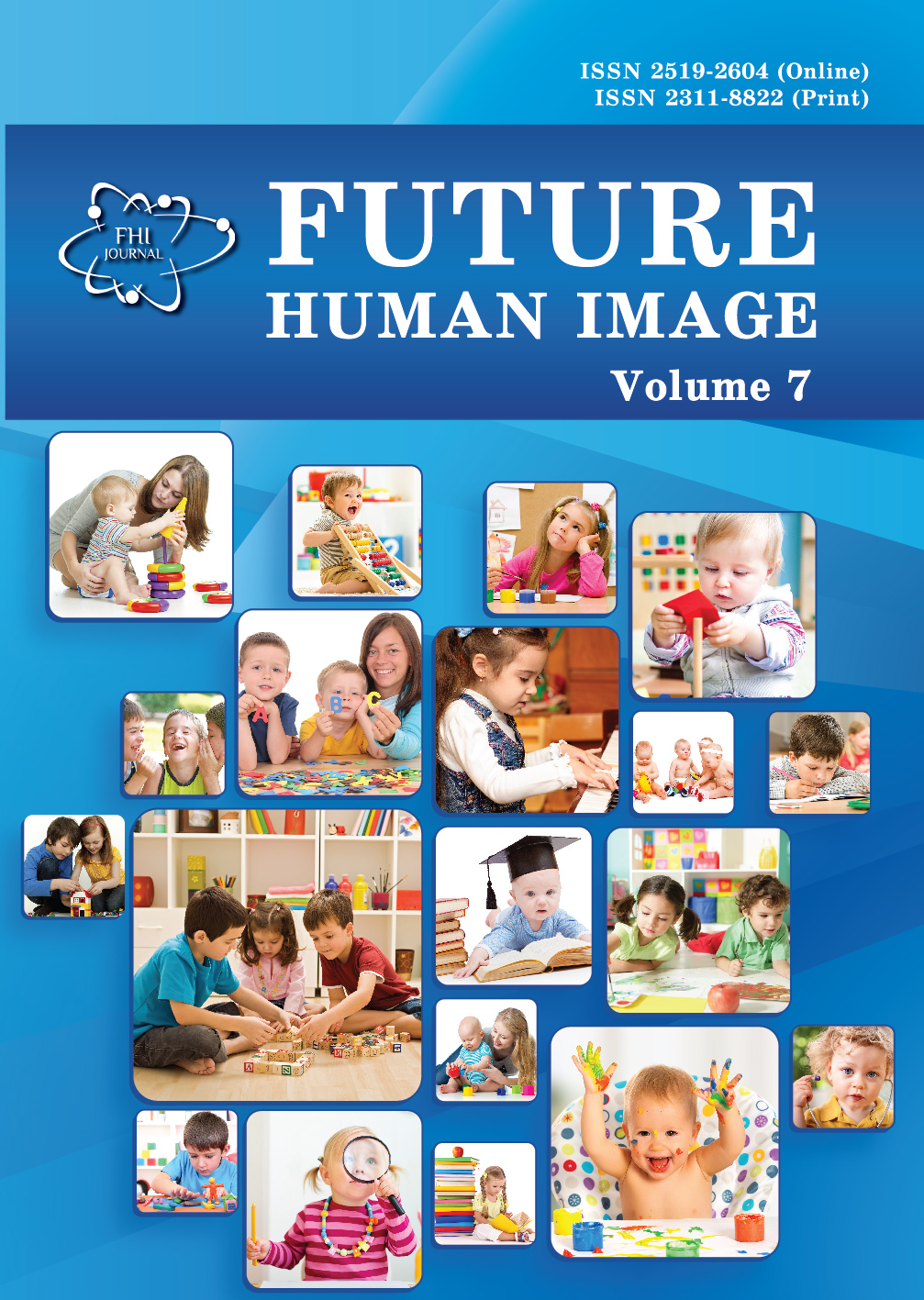
Usage of the counterfactuality as a term for marking the modality to some event becomes a new trend in social sciences. Recently this term was popular almost exclusively in psychology — especially in study of cognitive processes; but now it receive wide spectrum of interpretations: from economic to philosophical one. Most of such interpretations is concentrated near the problem of somebody’s attitude to situation that he or she was involved in. Meanwhile the term “counterfactuality” marks the real influence of the person on the course of events rather than his or her pure mental states. The person could change the future events due to his or her activity about these events: these changes rarely could be exactly the same that were calculated; desirable or even acceptable for this person; but these changes are for sure the consequence of his or her decision — direct or indirect; substantial or accidental; necessary or extraneous; evidently relevant or seemingly unrelated. For the philosophy the situation with ethical optation and its consequences is significant. Typical for analytic philosophy is the reconstruction of positivist logic of counterfactuality as possibility. According to this positivist point of view; we should not accept any human discovery; any creation because of their improbability — the sentences about them were simply the consequences of false sentences. More important is the fact that the consequents of the counterfactual conditional judgments are always true. Nobody can take the antecedent of the counterfactual conditional judgments as false from the point of view of human will; i.e. from the point of view of our intention and results of its implementation in our activity and our creations. These consequences are real because men act according to their definition of situation: their belief motivates them and push them to make real things that were unreal before. Reality of mind becomes real materially due to human activity. This is the way of design of future human nature on the basis of future human image.
More...
In this article; the question of opportunities and boundaries of scientific research of the evil is considered. It is emphasized that the notion “evil” is widely used in politics and journalism for the description of the most vital issues of the present; for instance; international terrorism. It induces social scientists to the methodological reflection of scientific and philosophical attempts of conceptualization; description and analysis of a complex of the phenomena and processes determined by the term “evil.” Abrief review of such attempts in science and philosophy of the 20th century is carried out.Despite the marginal status of the notions of Good and Evil in modern scientific discourse; the main scientific and philosophical concepts of human and society recognized in the 20th century admit the possibility of using these notions. Despite the fact that the idea of Evil is difficult to interpret as a concept term; which is the major obstacle to a scientific application of this; it is inappropriate to name it as unidentified. Such interpretation seems relevant to both social phenomena and anthropological ones.It is noted that the essential postulates of the modern scientific perception of “The Evil” analysis in sociology have been obtained in the writings of Karl Marx; Émile Durkheim; Karl Popper; Sigmund Freud and Friedrich Nietzsche. Those were Marx and Nietzsche who stated the polar vision of the phenomenology of Evil on the socio-philosophical level. Herewith; the survey of the conceptualizations and approaches to this problem is not limited with the abovementioned scientists; but involves the ideas and researches of a quite wide range of sociologists; philosophers and psychologists of the 20th century.Thus; the contents of the article; i.e. the overview of concepts and ideas; cannot be considered as the extensive one as the theme and the reference sources analyzed are boundless. This issue is to be regarded just as an introductory attempt to give an insight into the matter and get involved into the interaction on the subject.
More...
The paper considers the problem of Ukrainian divided universities; which appear at the result of Revolution of Dignity; annexation of Crimea by Russia as well as formation of quasi-republics of the East of Ukraine. Most of educational institutions form these territories were evacuated (students and teaching stuff); but “twin universities” appeared using campus and facilities of migrated ones. Author demonstrates the heuristic potential of using the interdisciplinary approaches for understanding the essence of this situation applying metaphors like “university cloning”; “university mitosis” and so on. This approach is strengthened by the ethical judgment through the basic axiological values of modern “idea of university” (freedom of thinking; academic freedom; institutional autonomy; will of knowledge and truth etc.) collected at Magna Charta Universitatum.From these positions; migrated universities comprehend as an active bearer and translator of “idea of university”. The “twin universities” have a lot of formal arguments to be comprehended as authentic ones; but author stresses on the fact that these institutions don’t fit the universities axiological criteria: these universities rejected ones’ own tradition; teachers are ready to work in censored conditions and manipulate the knowledge; teachers and students risk to became subjects of violence; the autonomy and academic freedom are absent. Author also appeals the historical facts on the example of Cambridge University origination that let make the optimistic conclusion concerning the perspectives of migrated universities.
More...
The problem of unfair behavior demonstrated by the consumer in contractual relations has been considered in the paper. It has been shown how to ensure the principle of inadmissibility of dishonesty which is enshrined in Art. 1 of the Civil Code of the Russian Federation (as amended in the Federal Law no. 302-FL on December 30, 2012) has taken effect since March 1, 2013. The examples from the legal practice proving that no legal treatment is often given to such behavior during the administration of justice have been provided. Nevertheless, the existence of a burden of conscientious behavior of the consumer in the civil legislation of the Russian Federation has been proved. In case of derogation from it, the norms of substantive and procedural law in the form of sanctions must be applied to the consumer. This approach, according to the author, will balance the rights and obligations of the parties of the contractual relation and level so-called consumer extremism.
More...
Author analyzes the foundation of freedom in Schelling’s first texts. In the centre of attention is the relation between being and ought to. It is shown that Schelling failed to use opportunity he himself had open in the thesis of being as sublated freedom and, after all, remained in confrontation between theoretical and practical. Intrinsic reason for such an outcome should be found in the concept of intellectual intuition.
More...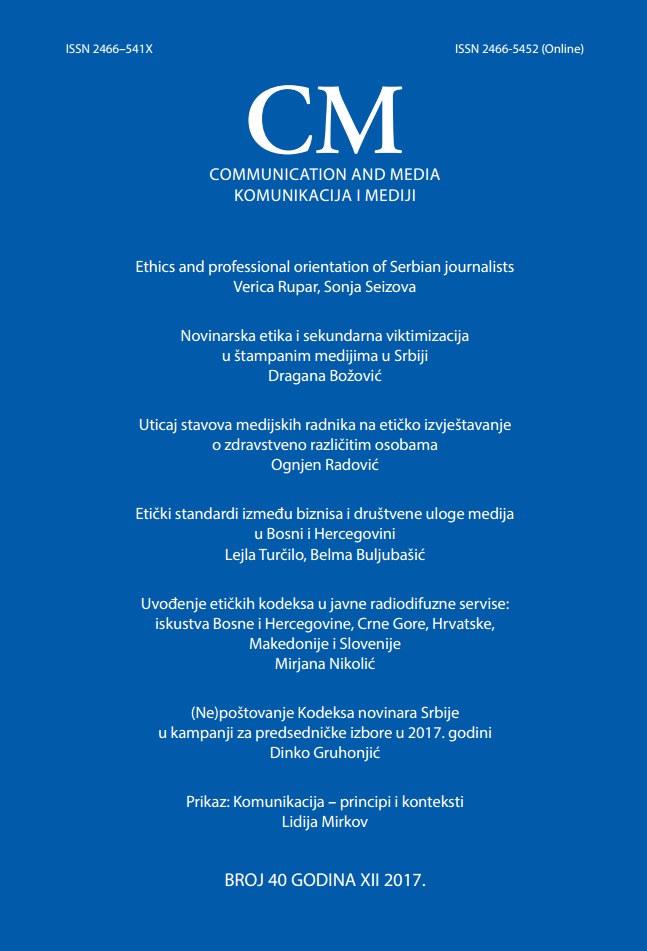
There is an extremely large number of media in Bosnia and Herzegovina, which at first glance gives the impression of pluralism and diversity of media content. However, since most media owners see the profit as their own goal, ignoring the social role and responsibility of media, in the constant struggle to attract and keep public attention and to satisfy advertisers’ interests, the first thing that is in jeopardy are ethical standards. The social role of the media is placed in a subordinate position in relation to their business role. This paper presents the results of the research of attitudes of journalists and other actors of the media scene (analysts, NGOs, regulators, etc.) about media and non-media reasons for crisis of journalistic standards and ethics. The semi-structured interviews with 44 respondents were conducted in order to examine attitudes towards the quality of the media scene in BiH, and the key findings show that media neglect their societal role, since owners accept political and economic pressures, which causes censorship and self-censorship. Some of the possible solutions for such situation include: raising media literacy level, strengthening professional journalistic community and insisting on stronger respect of legal regulations and ethical standards.
More...
Staring from the idea of self-regulation as the most optimal model of democratic and accountable regulation of the media sphere, especially in the field of electronic media, this paper provides a comparative analysis of norms and procedures pertaining to ethical issues in public broadcasting services, in the former Yugoslav republics, now sovereign Balkan states – Slovenia, Croatia, Bosnia and Herzegovina, Montenegro and Macedonia. One of the dilemmas which is discussed is whether the public service institutions should have their own ethical codes that define specific parameters and standards that are appropriate to this media model, or the existence of general codes of ethics is sufficient and applicable to PBS. The paper takes affirmative stance towards the existence of specific ethical codes of public broadcasting services that are in line with the specific social position and responsibility of these media towards the public, since this public is their founder, owner and controller. TV anchors, journalists, producers of commercial, public and civil media have very similar tasks, and are expected to be professional, unbiased, credible, accurate, non-manipulative, ethical, but people who work in public service institutions have a much greater responsibility that should be legislated with special laws and specialized ethical codes.
More...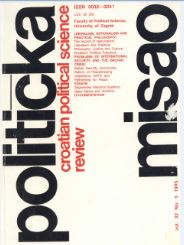
The author presents the central postulates from the latest works by John Rawls and Michael Walzer as the most prominent representatives of liberalism and communitarianism in the contemporary American political philosophy and points to their predecessors and parallels in political philosophy; from Kant and Hegel to Mill and Dewey. Since liberals and communitarians of today do not any longer advocate a “society” or a “community” in the traditional sense, but the “posttraditional” liberal-democratic community in which liberal principles of justice and human rights can be realized, their thinking is interesting also to those peoples who have set out to build liberal-democratic societies outside the states of developed West. Naturally, the realization of freedom and human rights depends on the cultural tradition of each people and on the historical “lebensweit” in general, but also on the virtues of liberal citizens who, in a communal political life, realize “postulates of communality comprised in liberalism ” (Walzer) and thus foster a free and good human life.
More...